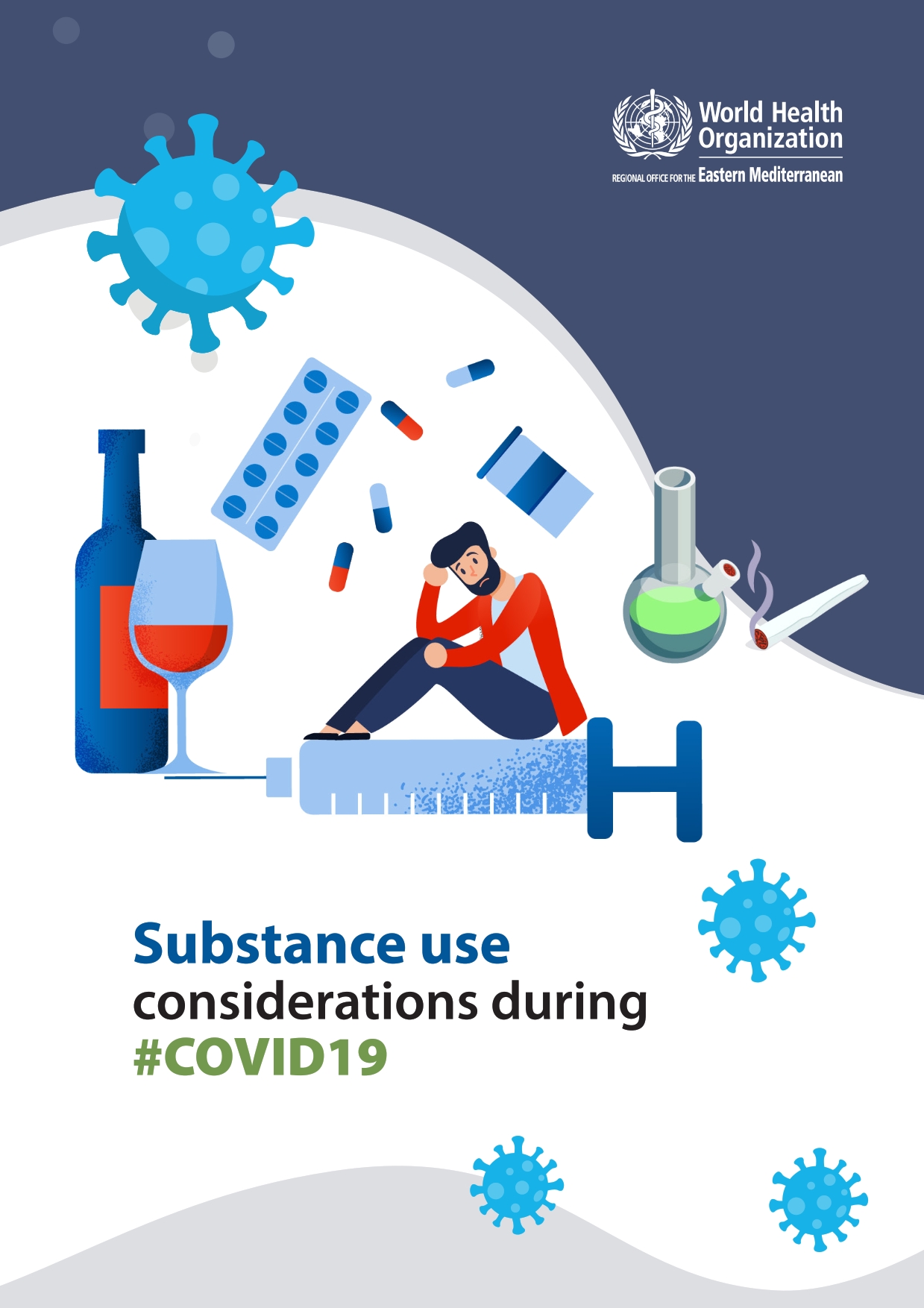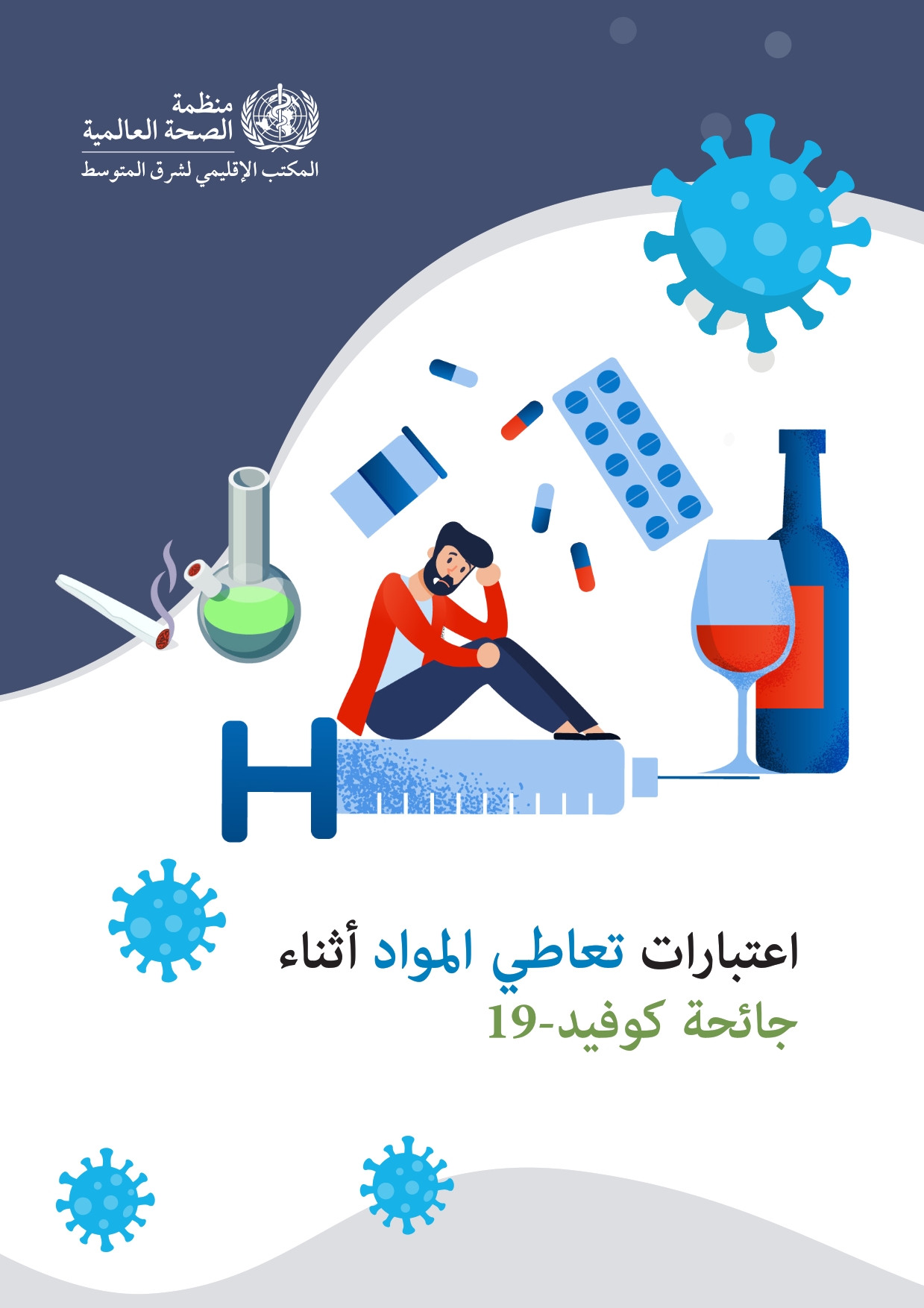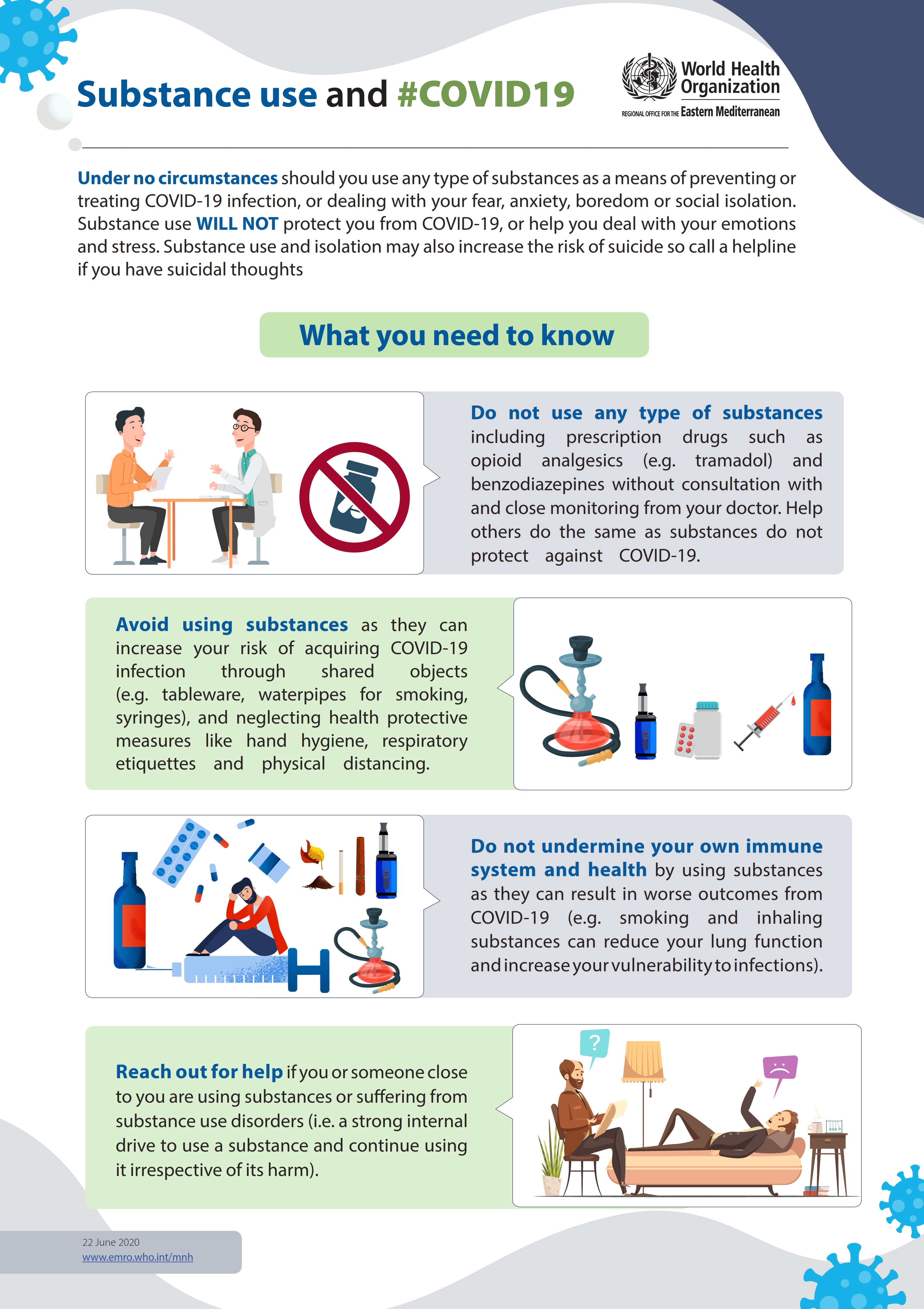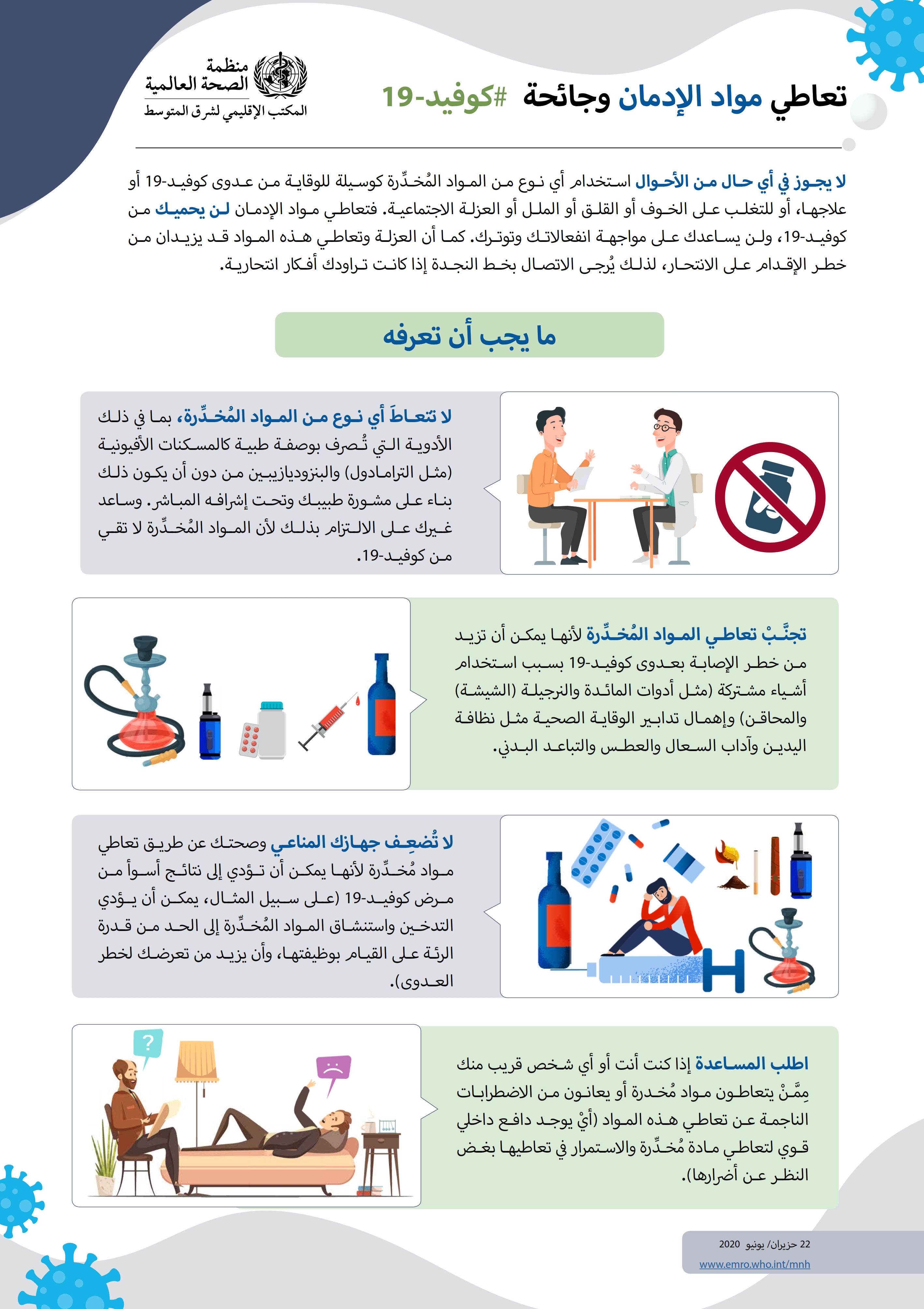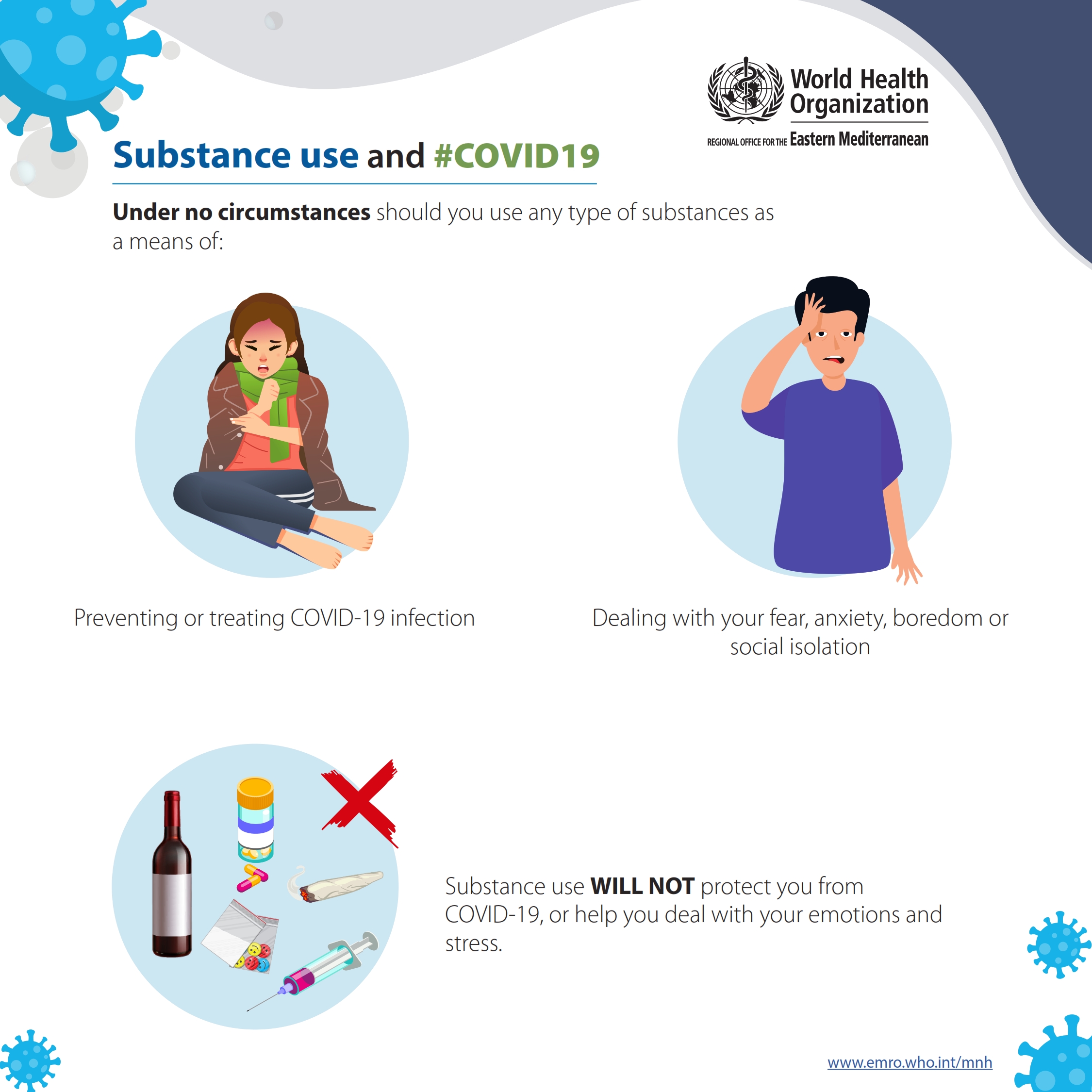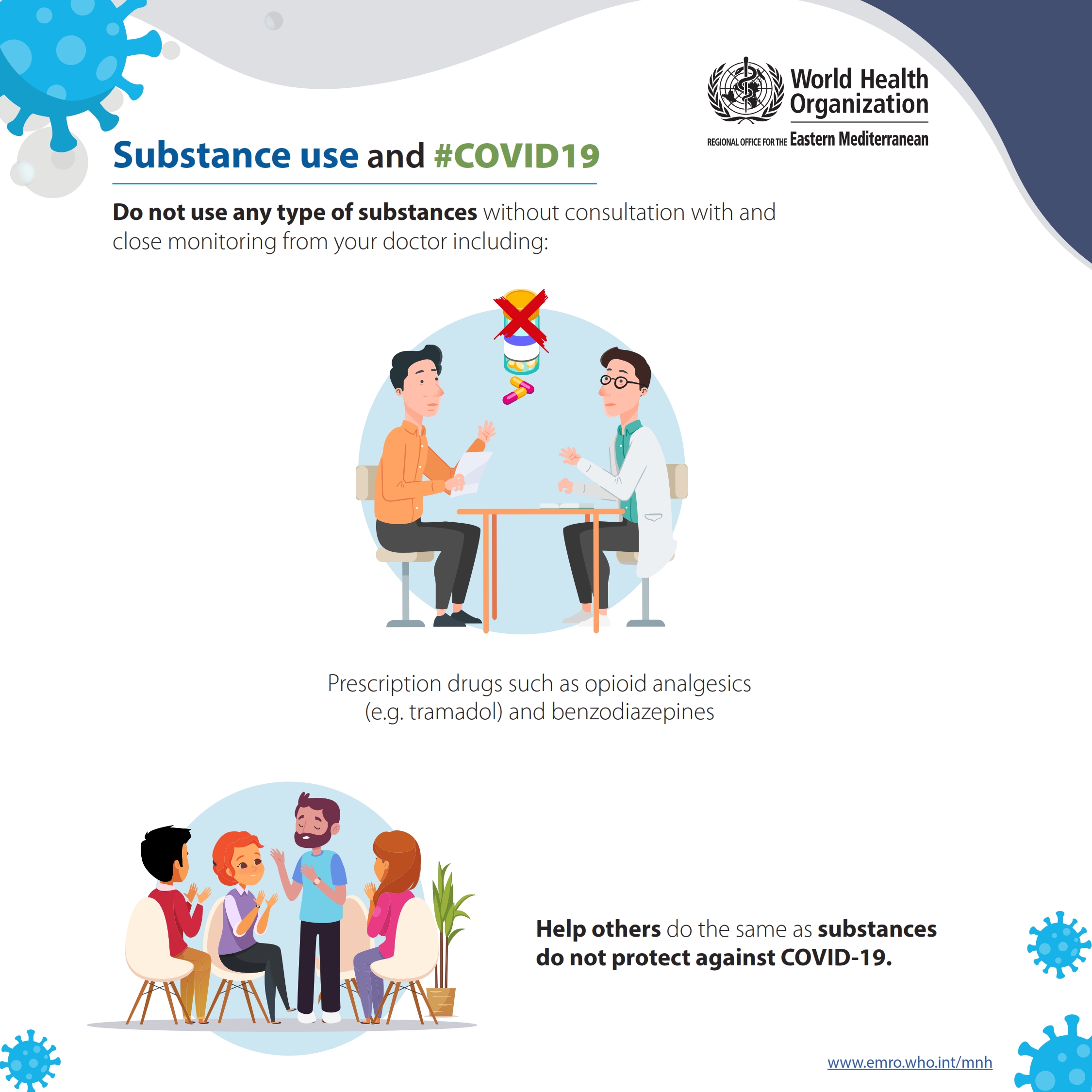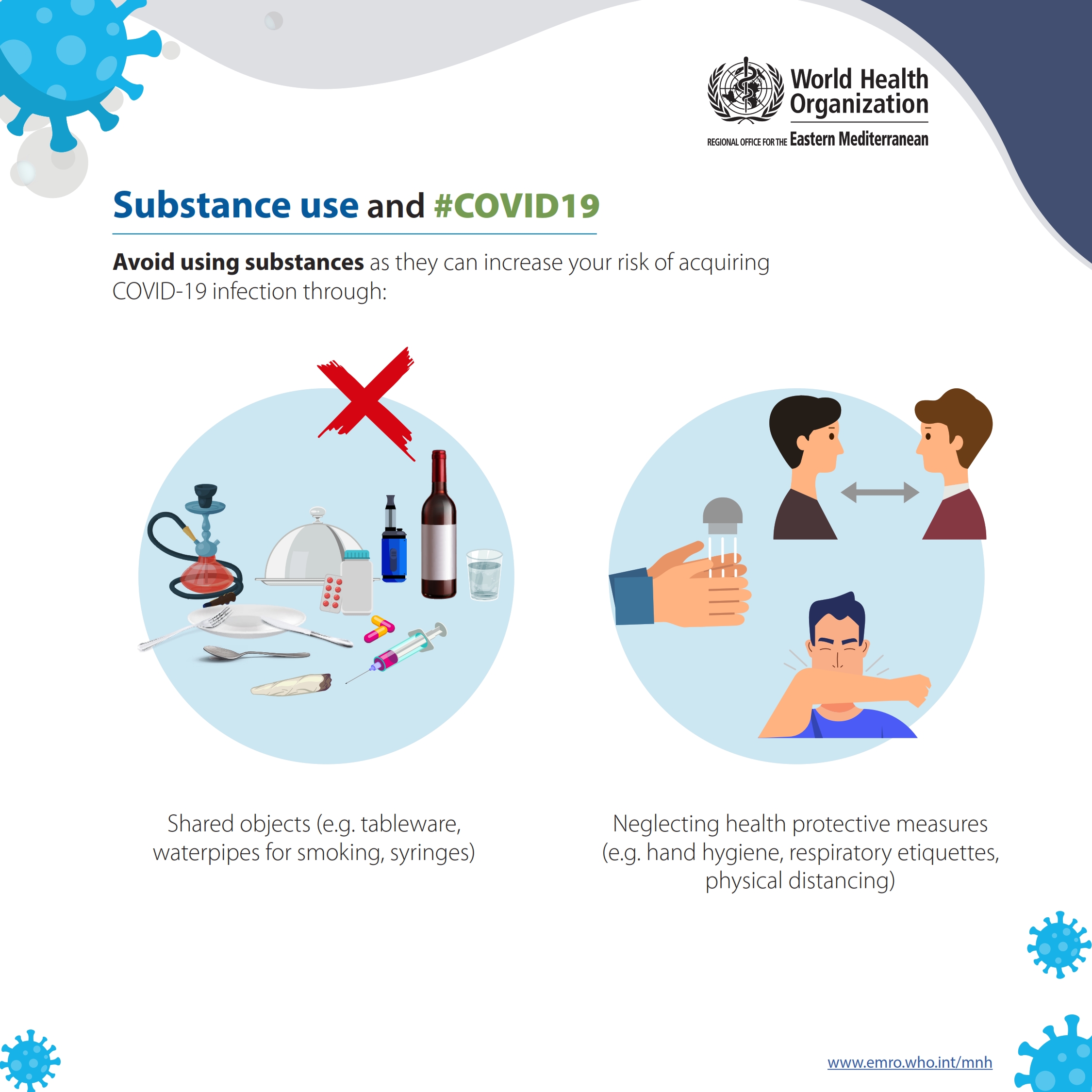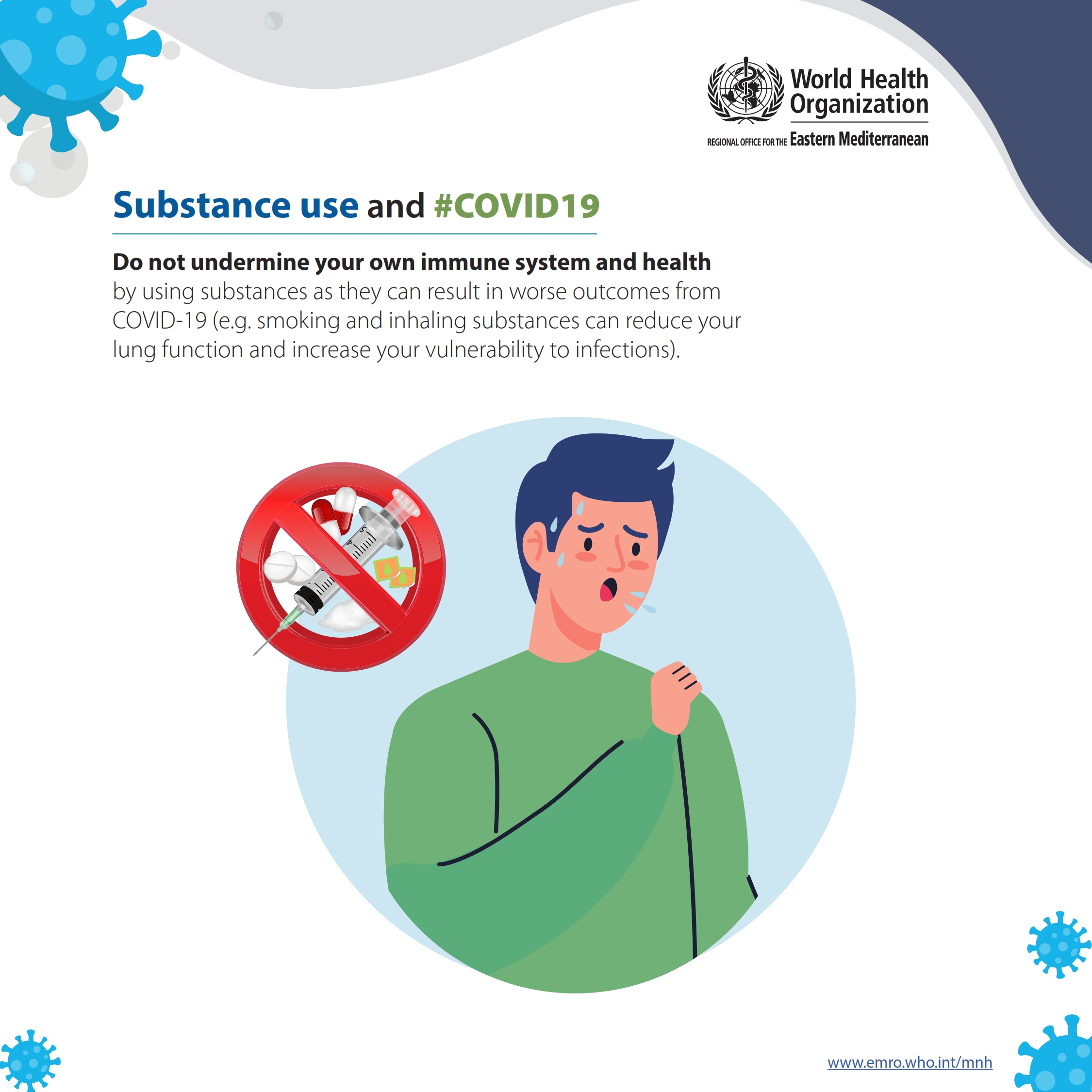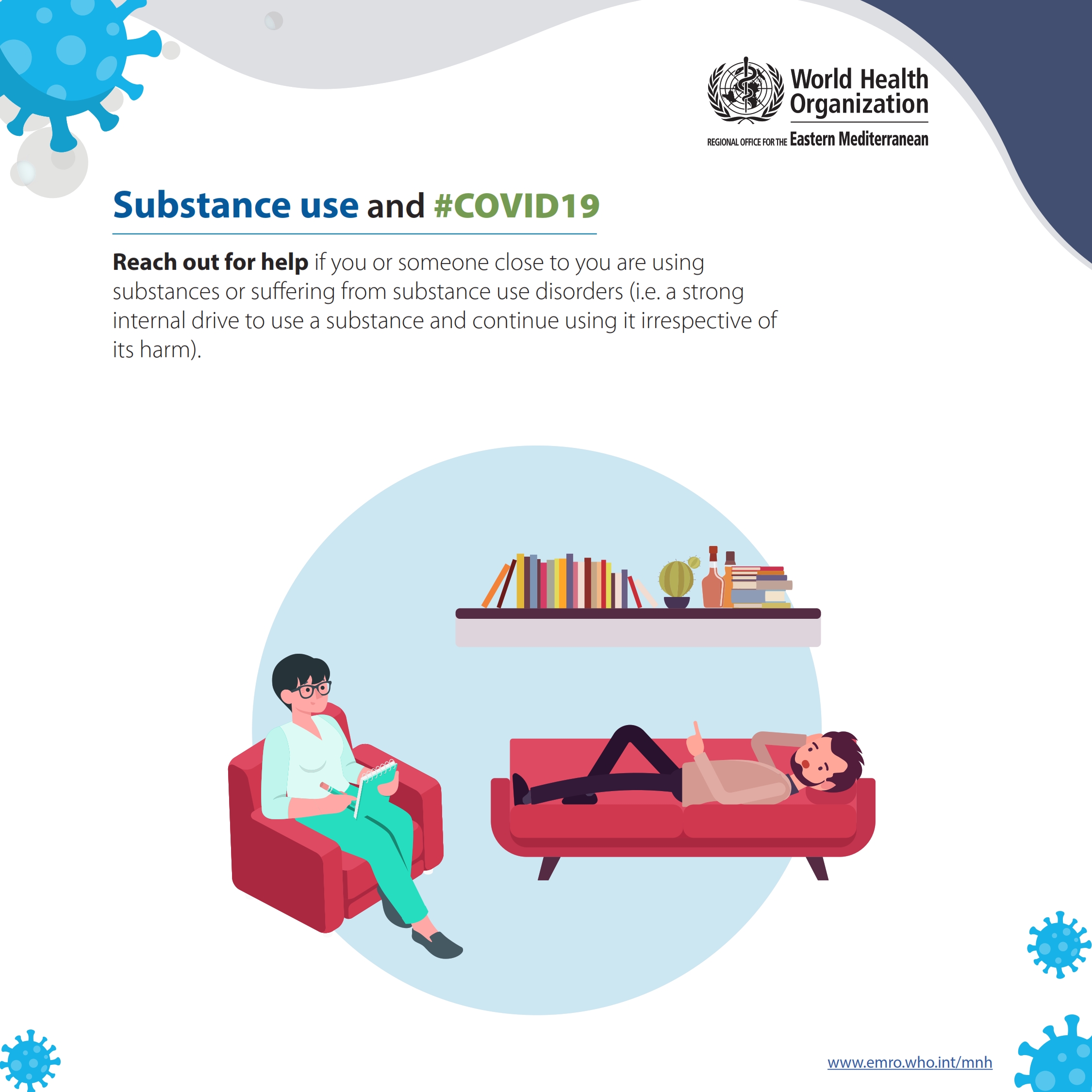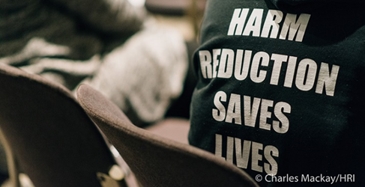
Data from the “World Drug Report 2019” show that 271 million people worldwide aged 15‒64 used an illegal drug once in the past year, while 35 million were suffering from substance use disorders. Substance use disorders include a number of conditions, including hazardous and harmful use and substance dependence, which is a disorder of regulation of the use of a psychoactive substance arising from repeated or continuous use of the substance. Its central feature is a strong internal drive to use the substance, manifested by impaired ability to control use, increasing priority given to use of the substance over other activities, and persistence of use despite harm and adverse consequences.
Substances include alcohol, cannabis, opioids, stimulants and nicotine. In the Eastern Mediterranean Region, cannabis is the most common drug used however, opioids and stimulants are the main drugs responsible for contact with health services. Reports show that the misuse of prescription drugs such as opioid analgesics (e.g. tramadol) and benzodiazepines are on the rise in some population groups in the Region.
The current COVID-19 situation has left many people worried and scared. The possibility of becoming severely ill or dying from COVID-19 infection can be overwhelming and stressful, so can the measures that many countries put in place to limit the spread of the infection (e.g. isolation, quarantines, lockdowns and physical distancing). Under no circumstances should people use any type of substances as a means of preventing or treating COVID-19 infection. Substance use will not protect from COVID-19. Different target groups have a responsibility to steer clear of substance use throughout this pandemic and beyond, and to help others do the same, and get the help they need, in case they are using substances or suffering from substance use disorders.
General public
Do not use psychoactive and other substances because there is no evidence that they protect against COVID-19.
Drugs are by no means a way of dealing with fear, anxiety, boredom or social isolation.
Substance use can increase your risk of acquiring COVID-19 infection through shared objects (e.g. tableware, waterpipes for smoking, and syringes), and neglecting health protective measures like hand hygiene, respiratory etiquettes and physical distancing.
Substance use can also result in worse outcomes from COVID-19. For example, smoking and inhaling substances can reduce lung function and increase vulnerability to infections.
People with substance use disorders are particularly vulnerable to COVID-19 infection and worse treatment outcomes because they are more likely to have a higher prevalence of co-morbid health conditions (e.g. mental disorders, HIV, TB, hepatitis, cardiovascular, liver, respiratory and kidney diseases) and often share other risk factors, such as under/malnutrition, physical inactivity, alcohol and tobacco use.
Health care workers
Address false beliefs among people who use drugs such as:
my body is resistant to the virus
I don’t need to follow prevention measures
substance use protects from infection.
Promote the standard recommendations to prevent COVID-19 infection, such as handwashing, respiratory hygiene, cleaning and disinfecting surfaces, and physical distancing.
Check-in with people who are likely to witness an opioid overdose like friends, family members and first responders to confirm they have access to naloxone and know how to administer it for emergency management of suspected opioid overdose.
Consider alternative ways of communication (virtual meetings) to ensure continuity in service provision (e.g. psychological care and support).
Consider possible misleading symptoms, such as amphetamine-related hyperthermia or being afebrile, due to misuse of medications, when assessing for COVID-19 symptoms among people who use drugs.
Ensure uninterrupted access to medicines used for opioid agonists maintenance treatment through different strategies, such as:
providing take-home medication for longer periods
prescribing extended-release formulations alongside additional psychosocial support
delivering medicines periodically to the client’s home (a “doorstep” delivery) with proper consideration of staff safety, potential of diversion and inadequate adherence to treatment.
Ensure continuity in provision of harm reduction services, including needle and syringe exchange and opioid substitution treatment programmes using methadone or buprenorphine.
Communicate in a timely manner any change in the practice of health facilities/centres providing services to people with substance use disorders, including changes in the working schedule.
Be aware, vigilant and actively look for signs of misusing prescription medicines among women or indications of domestic violence.
Policy-makers
Strengthen regulations and guidelines to ensure continuity of life-saving medical supply and commodities and health services for people who use drugs.
Ensure there are policies in place to facilitate access to opioid antagonist naloxone for all those at risk, including:
monitoring opioid prescribing practices
curbing inappropriate opioid prescribing
curbing inappropriate over-the-counter sales of opioids
increasing the rate of treatment of opioid dependence, including for those dependent on prescription opioids.
Strengthen capacity of health/social service providers for people who use drugs through short in-service trainings focused on prevention, early recognition and management of substance use and its related disorders during the COVID-19 pandemic.
Provide training for managers and staff about the changes in regulations and practices for supply and distribution of medicines and medical commodities in times of lockdown and quarantine.
Guarantee the access to controlled substances for pain management for people in need, while preventing its diversion for non-medical use.
Ensure availability of hygienic and personal protection equipment, such as soaps, disinfectant materials and face masks for healthcare workers providing services at substance use treatment facilities, like any other health facility.
Ensure accessibility and availability of comprehensive, affordable and evidence-based services for care to people with drug use disorders to:
improve their health, well-being and social functioning
stop or reduce drug use
prevent future harm by decreasing the risk of complications and relapse
help them achieve recovery to the extent possible.
Develop a dynamic coordination mechanism between the criminal justice and health sector in order to:
avoid coercive practices and involuntary treatment
guarantee continuation of services and support for people who use drugs in prison or correctional settings, upon release from prison or as an alternative to incarceration and for people who have been put on bail.
Ensure involvement of all stakeholders including health authorities, academia, criminal justice system, drug control authorities, civil society and nongovernmental organizations, for prevention, early intervention, treatment, care, recovery, rehabilitation and social reintegration measures, to minimize the adverse public health and social consequences of drug use
Factsheet and infographic
Social cards
Resources and additional information
Addiction. Cairo: World Health Organization; 2019.
AUDIT: the Alcohol Use Disorders Identification Test: guidelines for use in primary health care. Geneva: World Health Organization; 2001.
Community management of opioid overdose. Geneva: World Health Organization; 2014.
Coping with stress during the 2019-nCoV outbreak. Geneva: World Health Organization; 2020.
Coronavirus disease (COVID-19) pandemic. Geneva: World Health Organization; 2020.
Coronavirus disease (COVID-19) advice for the public. Geneva: World Health Organization; 2020.
Coronavirus disease (COVID-19) technical guidance: infection prevention and control/ WASH. Geneva: World Health Organization; 2020.
COVID 19: occupational health. Geneva: World Health Organization; 2020.
EPI-WIN: WHO information network for epidemics. Geneva: World Health Organization; 2020.
Guidelines for the psychosocially assisted pharmacological treatment of opioid dependence. Geneva: World Health Organization; 2009.
Helping children cope with stress during the 2019-nCoV outbreak. Geneva: World Health Organization; 2020.
International standards for the treatment of drug use disorders: revised edition incorporating results of field-testing. Geneva: World Health Organization and United Nations Office on Drugs and Crime; 2020.
Looking after our mental health. Geneva: World Health Organization; 2020.
Management of substance abuse. Geneva: World Health Organization; 2020.
Mental health and psychosocial considerations during the COVID-19 outbreak. Geneva: World Health Organization; 2020.
mhGAP intervention guide version 2.0. Geneva: World Health Organization; 2016.
My hero is you: storybook for children on COVID-19. Geneva: Inter-Agency Standing Committee; 2020.
The Alcohol, Smoking and Substance Involvement Screening Test (ASSIST). Geneva: World Health Organization; 2010.








